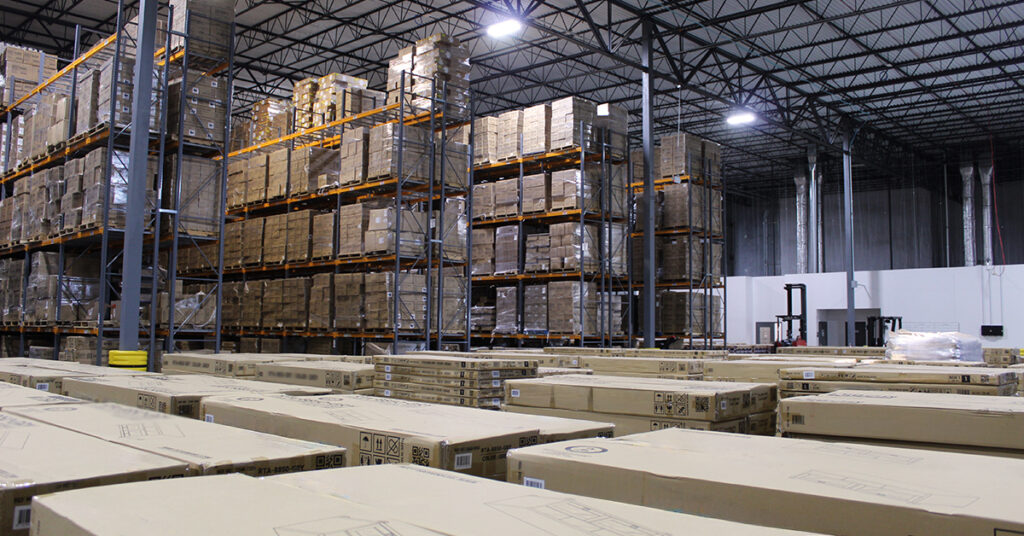With the intricate landscape of logistics and supply chain management, businesses often have no interest in managing their own private warehouse operations. Alternatively, these businesses look for efficient and cost-effective third-party logistics (3PL) warehousing solutions to meet their unique needs.
When evaluating potential 3PL providers, there are two prominent options for storage: public warehousing and contract warehousing. An understanding of the key differences between these two services will help to make an informed decision that aligns with a company’s warehousing and fulfillment requirements.
What is Public Warehousing?
Public warehousing is a shared warehousing solution. In this model, multiple businesses utilize a common warehouse space and associated services provided by a 3PL. It offers several advantages for companies looking for flexible storage solutions tailored to their changing demands.
What is Contract Warehousing?
Contract warehousing involves dedicated warehouse space and services provided by a 3PL exclusively for a single client based on a mutually agreed-upon contract. This model offers distinct advantages for businesses seeking greater customization and control over their warehousing and fulfillment.
Advantages of Public Warehousing
One of the primary benefits of public warehousing is its flexibility. Businesses can scale their storage space depending on fluctuating inventory levels, creating a desirable solution for seasonal or unpredictable warehousing needs. Additionally, since costs are shared among multiple clients, it can be a cost-effective option for businesses with budget constraints. Public warehousing requires minimal long-term commitment, allowing businesses the freedom to adjust their warehousing arrangements without being tied to extended contracts.
Potential Disadvantages of Public Warehousing
A downfall to public warehousing compared to contract warehousing is that businesses may have less control over operational processes and inventory visibility. While the capability to scale inventory levels for fluctuating demand is appealing, storage space is not guaranteed. During peak seasons, available space in public warehouses may be limited, leading to potential challenges in securing sufficient storage.
Another potential issue with shared space and resources is that clients may not receive the same level of personalized attention they would under a contract warehousing arrangement.
Advantages of Contract Warehousing
Contract warehousing allows businesses to tailor processes and workflows to their specific needs, ensuring optimal efficiency and productivity. The exclusive nature of the arrangement also provides companies with more control over inventory management and warehousing services. For businesses with steady and predictable demand, contract warehousing offers long-term stability and predictability, making it an attractive option for those looking for assured support.
Contract warehousing fosters a lasting relationship between the client and the 3PL, leading to a better understanding of the business’s needs and improved service over time. Companies can also negotiate service level agreements specific to their requirements, amounting to greater customer satisfaction.
Potential Disadvantages of Contract Warehousing
Contract warehousing often requires a larger initial investment due to the dedicated space and resources, which may be a barrier for some businesses. The commitment to a fixed term can pose a challenge to some businesses, particularly in response to changing market conditions. If a business has varying levels of demand, consistently utilizing the entirety of the dedicated space might be difficult.
Key Differences between Public Warehousing and Contract Warehousing:
| Public Warehousing | Contract Warehousing | |
| Operational Structure | Multi-client, shared warehouse space | Single-client, dedicated warehouse space |
| Flexibility & Customization | Highly flexible and adaptable to changing storage requirements | Tailored to the unique needs of a single client, offering greater customization |
| Cost Considerations | Cost-effective due to shared expenses among multiple clients | Customized services may entail higher costs but provide value for businesses with specific requirements |
| Contract Terms & Commitment | Minimal long-term commitment, suitable for businesses with fluctuating or temporary warehousing needs | Fixed-term contracts for businesses seeking stability and predictability in their warehousing arrangements |
Which Option is Right for Your Business?
The choice between public and contract warehousing largely depends on various factors specific to each business. Companies must carefully evaluate their size, seasonality, growth projections, budget constraints, and warehousing needs before making a decision.
For businesses with dynamic inventory demands and budget considerations, public warehousing can offer the necessary flexibility and cost-effectiveness. On the other hand, if customization, control, and stability are crucial factors for a company’s warehousing strategy, contract warehousing might be the preferred choice.
A potential third option is to utilize both contract and public warehousing. Companies may want to commit to a certain amount of guaranteed space and supplement with public warehouse space for demand fluctuations. Depending on the 3PL partnership, contract and public warehouse space can often be utilized in the same facility.
Public and Contract Warehousing Services with Beyond Warehousing
Understanding the differences between public warehousing and contract warehousing is essential for businesses seeking optimized warehousing solutions. Both options have advantages that cater to varying business needs and objectives.
As you evaluate your warehousing requirements, consider partnering with a reliable 3PL warehousing provider who can offer expert guidance and solutions tailored to your specific needs. Beyond Warehousing provides comprehensive warehousing services to help our clients thrive in the complex logistics landscape. Learn more or inquire about our services by contacting the Beyond team.
Need Public or Contract Warehousing Services?
Beyond Warehousing offers both public and contract warehousing options to meet your short and/or long-term storage needs.



